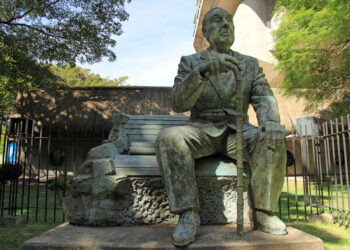
- Image via Wikipedia
Theories are like glasses. Put them on, and the world looks different. Debates that persist with no sense of consensus and closure are usually driven by groups wearing different glasses, which is why they cannot see — let alone understand — their opponent’s position. When things start getting ugly, one side starts accusing the other of being blind to reality.
In his book chapter, “Theories of Intellectual Property,” Harvard professor of Intellectual Property Law, William Fisher, argues that IP rights can be viewed through four political lenses:
- Labor theory recognizes and rewards individuals for their hard work.
- Utility theory (or utilitarianism) attempts to maximize net social welfare.
- Personality theory acknowledges that creation is a form of self-expression and selfhood.
- Social Planning theory views intellectual property as a good that can be used to build a just and attractive culture.
Fisher argues that lawmakers should first attempt to understand the political theory beneath a new policy proposal and then ask appropriate questions. For example:
- Labor theory: Does it reward those for their labor?
- Utility theory: Does it maximize public wealth?
- Personality theory: Does it allow individuals to express themselves?
- Social Planning theory: Does it lead to a richer society?
Understanding the NIH Public Access Debate
Preceding the Omnibus Appropriations Act of 2009, which made the NIH Public Access policy permanent, the Subcommittee on Courts, the Internet, and Intellectual Property of the House Judiciary Committee convened a hearing in 2008 to discuss the legality and implications of this policy.
Representative Howard Berman (D-CA) and his co-chair John Conyers (D-MI) both voiced concern that their main concern was one of jurisdiction; their subcommittee never had a chance to evaluate the policy before the mandate was made into law.
Brought before the committee were: Elias Zerhouni, then Director of the NIH; Marty Frank, Executive Director of the American Physiological Society; Heather Joseph, Executive Director of the Scholarly Publishing and Academic Resources Coalition (SPARC); and Ralph Oman, professor of intellectual property law at George Washington University.
Zerhouni’s position was control of content that is beneficial to science and society. Free access to the scientific literature is useful to society by enhancing discovery, innovation and ultimately improving public health. The NIH, as a source of public research funds, has the right to set conditions on the control of the research output. Zerhouni is arguing from the Utility theory of intellectual property.
Frank’s position was that the missions of scientific societies cannot be completed without creating some profit from publishing, and that ownership of content and control of distribution was essential for a publisher’s ability to make a profit. The chief role of the scientific publisher is to manage the peer-review process, which ensures the quality and integrity of research articles. Requiring peer-reviewed manuscripts to be submitted to PubMed Central would lead to journal subscription cancellation and the unraveling of the market for science publishers. Frank is arguing primarily from the Labor theory, such that publishers should at least be rewarded for managing the peer-review process.
Joseph’s position reaffirmed Zerhouni’s argument that free access to scientific literature has a positive effect on society. Joseph spent much of her time recounting the time she spent searching the PubMed database trying to find new research on childhood diabetes for her five-year old son. From this standpoint, Joseph is arguing from the Social Planning theory, implying that access is not merely an economic matter, but a social justice issue as well. The kind of society we want to create is one where informed mothers can care for their children.
Lastly, Oman argues from the constitutional basis of ownership and copyright. Unless the government wants to become a publisher, Oman maintains, Congress should keep its “hairy snout” out of the publication process and should not create policy that hurts private publishers. This argument is based on the Labor perspective.
All of the above stated positions are correct in the sense that they are consistent and non-contradictory. The main battle appears to pit Labor theory against Utility theory. Considering that we’re dealing with scientific information and not American-made automobiles, the argument for maximizing social welfare seems to have the upper hand.
The risk, however, is in not reconciling these two views. The Utility theory assumes publishers will continue to thrive into the future and will continue to provide labor (managing peer review) for which they will not receive compensation. If publishers start failing under the NIH mandate, the NIH will need to consider either compensating publishers directly or lengthening the delay between publication and free access.
A more insidious outcome would be if the NIH policy discriminately harms non-profit publishers over commercial ones. If this happens, we may find a few large, commercial publishers running the formal scholarly communication process exclusively and, as a society, end up paying more for our taxpayer-funded research.
I doubt that scientists, librarians, and taxpayers see this as a desirable outcome.
—
References:
[1] Fisher, W. (2001). Theories of Intellectual Property. In S. R. Munzer (Ed.), New Essays in the Legal and Political Theory of Property (pp. 168-200). Cambridge: Cambridge University Press.
![Reblog this post [with Zemanta]](http://img.zemanta.com/reblog_e.png?x-id=2bffe651-1143-4741-b6f0-33c424b694a1)


